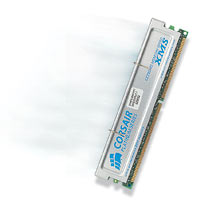
Memory
RAM Speed - Access Time, Megahertz (MHz), Bytes Per Second
Prior to
SDRAM, speed was expressed in terms of nanoseconds
(ns). This measured the amount of time it takes the module to
deliver a data request. Therefore, the
lower the nanosecond speed, the faster. Typical speeds
were 90, 80, 70 and 60ns. Older 486 machines may have 80 or 90.
More recent Pentiums will have 60 or 70.
|

|
|
MHz Speed
|
Total Clock Cycles per Second
|
Divide by 1 billions to get
nanoseconds per clock speed.
|
|
66
|
66,000,000
|
15
|
|
100
|
100,000,000
|
10
|
|
133
|
133,000,000
|
8
|
Often,
the last digit of a memory part number will represents the speed
such as -6 = 60ns.
SDRAM speed is measured in megahertz (MHz). Speed
markings on the memory chips may still specific nanoseconds, but
in this case in represents the number of nanoseconds between clock
cycles. To add to the confusion the markings on the chips don't
match the Mhz value. Here is a conversion chart.
To
calculate bytes per second you need to know the Bus
Width and Bus Speed of your PC. The first thing to
remember is 8-bits = 1 byte. If you
have a 64-bit bus, than 8 bytes of information can be transferred
at one time. (64 / 8 bits = 8 bytes)
If
your bus speed is 100Mhz (100 million clock cycles per second) and
the bus width is 1 byte wide, the speed is 100 MB's per second.
With a 64-bit width, the speed is 800 MBs per second (64 / 8 *
100,000,000)
Rambus modules are measured in megabytes per second. Rambus
modules are either 400 or 300Mhz. Because they send two pieces of
information every clock cycle, you get 800 or 600Mhz. They have a
16-bit bus width or 2 bytes (16/8). The 400Mhz module speed is
1600MB a second or 1.6GB a second. (400,000,000 * 2) * 2. The
300Mhz module provides 1.2GBs a second. |